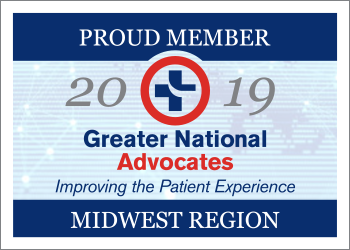 Sometimes people will tell me that they feel inadequate when dealing with the health care system. I always say that no one should feel that way; rather, our health care system is designed to be confusing. When you’re not feeling well, it’s difficult to make sense of it all and remember everything you’re supposed to do. This blog is about how that can even happen to a wonderful patient advocate when she has a medical emergency! Spoiler alert: I’m okay! In December, I fainted and hit my head on the floor, was briefly unconscious, couldn’t speak at first, and my head was bleeding. Fortunately, my husband - who normally sleeps through everything! - heard the load thud and ran in right away. He said it was pretty scary. He took me to the ER. It was around 2:45am. My memory of what happened that night/morning is pretty fuzzy. I do remember thinking “I’m a patient advocate, I need to advocate for myself.” However, I had a head injury (concussion) and was in no shape to be an advocate! I recall the nurse going through my medications and supplements, and confirming my medication allergies. I later wondered if my husband would have remembered that I’m allergic to sulfa and penicillin (he didn’t remember our now 27 year-old son’s penicillin allergy when he was 12 and had to go to the ER for stitches - but that’s a story for another time!). That was a reminder to me to review that information with my family members. I had an EKG, chest x-ray, and a head and neck CT scan. I know I told my husband a couple of questions that I wanted to remember to ask the doctor. I don’t remember what the questions were or if either of us asked them. My head just felt so foggy. I recall that the doctor came in to tell me that all my tests were okay and I could leave. She was practically out of the room before she finished telling me that. I yelled to her that I had questions and she turned back to me but it was very rushed. After she left, the nurse shrugged and told me that they only have one doctor staffing the ER overnight and the ER was full. The nurse helped me walk to the bathroom and back. She then asked me if I felt okay to go home. I told her that my legs felt very weak and “weird.” She said “well, we’re completely full but if you want to stay here, we can wheel you to a back hallway and you can rest there.” Um, no! I did what I think most people would do and said I’d rather go home versus lying in a back hallway of an ER while Covid, flu, and RSV were filling up hospitals around the country. I probably should have asked her to relay that info to the doctor but, as I keep saying, it was very hard to think. I had leg weakness for a few weeks but did have two telehealth doctor visits about that in the few days following my ER visit. The nurse then told my husband to go get the car, warm it up, and that she’d bring me out. This is the point where the nurse definitely did not follow patient safety protocol! Once my husband left the room, she started going through the discharge instructions with me. I remember thinking that he should have been there to listen because my brain really was not registering everything. However, I didn’t have my cell phone with me and couldn’t call him. And, honestly, I really just wanted to go home, wash the blood out of my hair, and sleep! As patient advocates, we know that everyone needs someone with them at discharge… and I think that every nurse, doctor, hospital administrator, etc should know that too! It is so important to understand what signs and symptoms require a trip back to the ER or a call to the doctor. I really wasn’t fully comprehending all that she was telling me. Reflections on this experience: (1) I understand even more why people of any age and ability need someone with them in the hospital. I’m very educated about how the system works and about patient safety protocols BUT when you have a situation that requires an ER visit or hospital stay, it is really difficult to think clearly; certainly that applies to a head injury situation! (2) This was a reminder of the importance of regularly reviewing medications, allergies, health issues with whoever the people are who may be in the ER or hospital with you. (3) During an ER visit about 10 years ago, I recall the ER doctor telling me that the ER is about dealing with acute health issues; if they don’t find anything terrible, they send you home - even if they haven’t figured out why the issue happened or addressed all your symptoms. That’s exactly how it felt on my recent visit. Be sure to follow up with your regular doctors after your ER visit. (4) This was another reminder that our health care system can do better Obviously, that is not news to me, or probably to most of you reading this, but it was a first-hand experience of it. In this case, the most glaring example is that the nurse should have gone through the discharge instructions before sending my husband to get the car. We’ll see if the hospital system takes my feedback into account. Comments are closed.
|
AuthorWrite something about yourself. No need to be fancy, just an overview. Archives
February 2024
Categories |

 RSS Feed
RSS Feed



